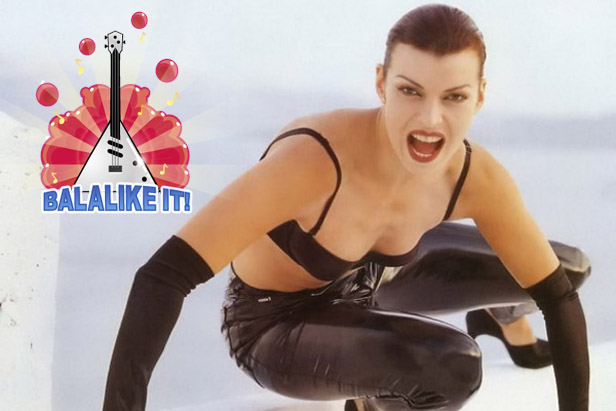Pop music of the crazy 90s? Balalike it!

There were outlandish images, stylistic experiments, and attempts to produce a “western sound,” replete with texts of rather dubious quality. And although many now hang their heads in shame, the words of a song, according to a Russian proverb, stick in the mind.
These songs did the rounds on TV and radio — even on public transport, and became ingrained in the subconscious. So much so that Russians today, like it or not, still know them by heart. From the most rocking rocker to the most outside outsider, everyone knows these three-note wonders, and probably even hums them when no one is within earshot. Two decades later, these songs arouse a certain nostalgic fondness.
Despite the litany of musical crimes, today’s collection does in fact contain some worthy items: for example, Ivanushki International, which started out dabbling in trip-hop without even realizing it, while Gosti is buduschego (Guests From The Future) in the late 1990s are comparable to Moloko and Kiesza, the author of “Hideaway,” perhaps the main hit of this summer.
The duo of Eva Polna and Yuri Usachev was the most free-thinking Russian pop group, more musically than lyrically. They managed to package a fashionable British electronic sound into a pop format. “Run From Me” was just the start, followed by a hit every year thereafter. As soloist Eva Polna told Afisha magazine, three years ago: “We didn’t realize we were making a revolution, just wanted to create something similar to western electronic music with delicate female vocals and interesting lyrics. The revolution part became clear later when new groups started appearing in imitation of us. It was like: if we can, they can. We wrote “Begi ot menya” (Run From Me) almost in spite of our very selves. We were making jungle music and thought: now everyone will start listening to intelligent electronic music! And of course, nothing of the sort happened. And we were like, oh?! In that case we’ll write a song that will be heard from every vacuum cleaner! We were driven by the desire to prove that pop music can be not only primitive, but fashionable and intellectual. And it worked.”
| TRACKLIST: |
| 1. Gosti iz buduschego – Begi ot menya (1999) 2. Gosti iz buduschego – Ti gde-to (1999) 3. Lada Dance - Aromat lubvi (1997) 4. Hi-Fi – Ne dano (1998) 5. Natalia Vetlitskaya - Posmotri v glaza (1992) 6. Shura - Ne ver slezam (1998) 7. Ivanushki Int. – Topoliniy pukh (1996) 8. Ivanushki Int. – Tuchi (1996) |
The pseudonym of our next heroine, Lada Dance, denotes a certain dance style — an early version of 90s electropop with hooks and dance moves, brisk and showy.
It was the song “Ne dano” (Not given) that marked the arrival of the group Hi-Fi with its ingenious guitar samples and intimate quivering vocals, which, incidentally, belonged to the group’s producer and song-writer, Pavel Yesenin. Hi-Fi is almost unique as the only pop group whose members had no part in the creation or performance of the songs.
Another peach in our collection is Natalia Vetlitskaya — the lighter side of Lada Dance, blonde femme fatale and not devoid of self-irony. The video for the song “Posmotri v glaza” (Look Into My Eyes) is one of the few clips of the 1990s that can be watched in 2014 without weeping.
In the zoo that was the Russian pop scene of the 1990s, the all-conquering king of the freaks was Shura. A toothless, homosexual beanstalk in heels — oh yes, in the 90s anything went. But even such a risqué persona could not completely eclipse the powerful, textured voice and rather poetic repertoire. “Ne ver slezam” (Do Not Believe In Tears) was a real super-hit, a thunderous arrangement that blasted out of every TV, radio, and cassette player (they still existed) in 1998.
Ivanushki International was the first trendsetting Russian boy band — and, of course, they had plenty of big hits. “Tuchi” (Storm Clouds), like the song “Oblaka” (Clouds), was real trip-hop, and it was the video for “Tuchi” that set the group on the path to glory. Alas, the guys did not last long in this genre: on September 1, 1998, soloist Igor Sorin committed suicide. The song “Topoliniy pukh” (Poplar Fluff) is more representative of the later Ivanushki.
All rights reserved by Rossiyskaya Gazeta.
Subscribe
to our newsletter!
Get the week's best stories straight to your inbox